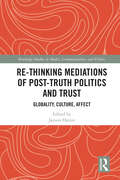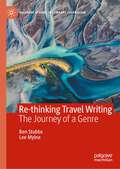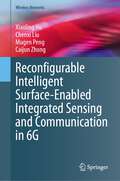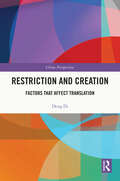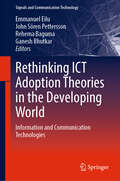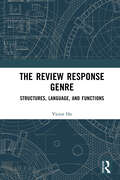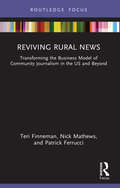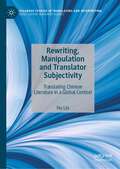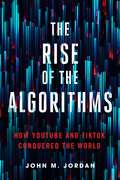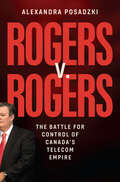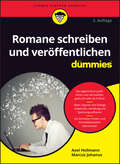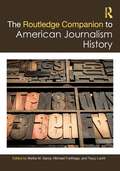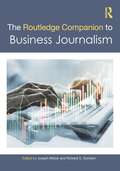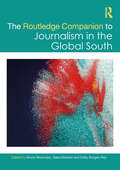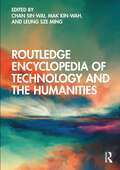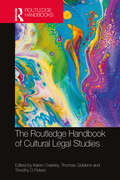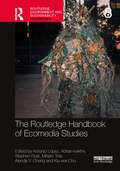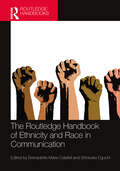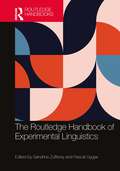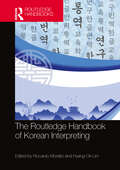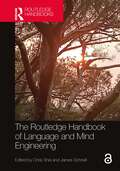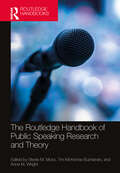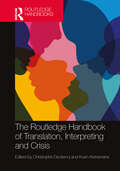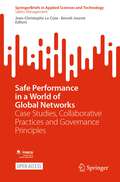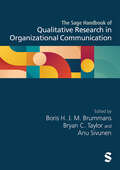- Table View
- List View
Re-thinking Mediations of Post-truth Politics and Trust: Globality, Culture, Affect (Routledge Studies in Media, Communication, and Politics)
by Jayson HarsinThis collection reaches beyond fake news and propaganda, misinformation, and charismatic liars, to explore the lesser-publicized cultural forms and practices that serve as a cultural infrastructure for post-truth society and politics. Situating post-truth in specific contexts as a site of contestation or crisis, the book critically explores it as a dynamic and shifting site around which political and cultural practices in specific contexts revolve and overlap. Through a breadth of perspectives, the volume considers a number of overlapping cultural and political developments across varying national and transnational contexts: changing technologies and practices of cultural production that sometimes shift and at other times reproduce authority of traditional institutional truth-tellers; seismic cultural changes in representations, values, and roles regarding gender, sexuality, race, and historical memory about them, as well as corresponding reactionary discourses in the "culture wars"; questions of authenticity, honesty, and power relations that combine many of the former shifts within an all-encompassing culture of (self-)promotional, attentional capitalism. These considerations lead scholars to focus on corresponding shifting cultural dynamics of popular truth-telling and (dis-)trust-making that inform political culture. In this more global view, post-truth becomes foremost an influentially anxious public mood about the struggles to secure or undermine publicly accepted facts. This nuanced and insightful collection will interest scholars and students of communication studies, media and cultural studies, media ethics, journalism, media literacy, sociology, anthropology, philosophy, and politics.
Re-thinking Travel Writing: The Journey of a Genre (Palgrave Studies in Literary Journalism)
by Ben Stubbs Lee MylneThis book stems from the question that we as co-authors grappled with for the past 3-plus years while in our own periods of stasis during the pandemic: What place does the travel writing genre hold in a post-COVID world? With the massive interruptions to travel and travel writing across 2020-2023 as the pandemic forced us indoors and into isolation, it also raised many other pertinent questions about the practice of and future of travel writing. Part of the prompt for this book comes from the post-pandemic assumption that in an ecologically fraught, less mobile, and more uncertain world, there may not be a place for travel writing as we know it to exist in any meaningful way. We examine the problems and solutions apparent for travel writing as it engages with a period of re-thinking, prompted by the pandemic, though necessary for a plethora of other reasons as well. As academics and travel writing practitioners, with decades of experience in the field, we offer a unique perspectiveon this topic – as we have the in-the-field experience of professional travel writers, and we have the academic grounding to better understand the history, theoretical concerns and contradictions of the genre to provide a more in-depth perspective to our travel writing colleagues. This grounding allows us to access a unique and valuable perspective for Re-thinking Travel Writing: The Journey of a Genre for academics, aspiring travel writers and contemporary colleagues in the field.
Reconfigurable Intelligent Surface-Enabled Integrated Sensing and Communication in 6G (Wireless Networks)
by Xiaoling Hu Chenxi Liu Mugen Peng Caijun ZhongAs the main trend and key enabling technology for next-generation wireless networks (i.e., 6G), integrated sensing and communication (ISAC) can effectively improve spectrum efficiency, hardware efficiency, and information processing efficiency. However, it faces several deficiencies, including limited coverage due to high-frequency signals and limited communication-sensing performance due to uncontrollable wireless environments. Reconfigurable intelligent surface (RIS) provides novel dimensions to address these deficiencies by intelligently manipulating the wireless propagation environment in an energy- and hardware-efficient manner. RIS-enabled ISAC is expected to comprehensively promote the multi-dimensional performance of 6G, such as communication capacity, sensing accuracy, and coverage. Nevertheless, to fully realize its potential, one needs to figure out the impacts of RIS on joint communication and sensing performance and tackle new technical challenges in beamforming design and signal processing. The goal of this book, therefore, is to deliver a thorough understanding of RIS-enabled ISAC from three perspectives: performance analysis, beamforming design, and signal processing. Specifically, the authors provide a brief introduction to RIS-enabled ISAC, including basic concepts, motivations, potential application scenarios, and an overview of the state-of-the-art research on RIS-enabled ISAC. The theoretical performance analytical frameworks of RIS-enabled ISAC and their corresponding results are also discussed. Based on this, several critical issues are identified and elaborated on, including signal processing technologies such as angle and Delay-Doppler information acquisition, and air interface technologies such as beamforming designs. Finally, the book concludes with future trends and open issues for further research.The book would be beneficial for researchers, graduate students, and industry professionals who wish to gain a comprehensive understanding of the latest developments and challenges in RIS-enabled ISAC. By providing insights into the potential of RIS-enabled ISAC and the technical challenges that need to be addressed, the book can aid in the development of practical solutions for next-generation wireless networks and contribute to the advancement of the field of wireless communications.
Restriction and Creation: Factors That Affect Translation (ISSN)
by Deng DiThis book presents an overall picture of the constraints faced at different stages of the translation process, providing a more scientific approach to descriptive translation studies.The study investigates translation constraints at three different levels. The micro-system includes the original work, the translator, and the translation itself. The meso-system includes various factors that represent power, such as individuals, groups, and institutions. The book also examines the macro-system, which includes factors related to culture, society, and even the global context. Drawing on the principles of literary hermeneutics, this book advances the study of translation constraints from description to interpretation through systematic analysis. Incorporating the latest scholarship from both national and international sources, the book discusses translation studies when it explores translation constraints and analyses translation constraints when it discusses translation studies.The book will be of interest to scholars and students of translation theory and practice and Chinese studies. It will also be of value to translation professionals.
Rethinking ICT Adoption Theories in the Developing World: Information and Communication Technologies (Signals and Communication Technology)
by Emmanuel Eilu Ganesh Bhutkar Rehema Baguma John Sören PetterssonThis book provides extended frameworks and models to help with the adoption of information and communication technologies (ICT) in developing countries. The book first discusses the extent to which conventional ICT theories can be rigid in nature, often unable to handle the constant advances in technology, and technology adoption, implementation, usage, and disposal, not to mention different needs and cost availability in developing countries. The authors go on to show how new and revised models, tested in many societies in developing countries, can solve this mismatch. The authors provide examples of successful ICT adoption in developing country settings, in the areas of agriculture, culture, forestry, education, economics, health, and governance. The authors also show how techniques from persuasive design, philosophical designs, and motivational designs have been adjusted to facilitate successful ICT adoption, implementation, usage, and disposal in targeted regions.
The Review Response Genre: Structures, Language, and Functions
by Victor HoExpanding the scope of the metadiscourse construct, Ho offers a comprehensive analysis of the online review response genre using hotel managers' responses to negative reviews posted by dissatisfied customers on TripAdvisor. He adopts a robust research methodology that involves both quantitative and qualitative analyses of three different types of data: managerial responses to negative comments, questionnaire responses from dissatisfied customers who wrote the reviews, and interview responses from hotel managers who wrote the responses. By drawing upon the genre theory and the construct of rapport and metadiscourse, the analysis shows that hotel management’s attempts at service recovery can be materialized through the move structures of the managerial responses, and the strategies used in managing rapport with dissatisfied customers and in persuading both existing and potential customers to purchase accommodation services from the hotels. An essential reading for students and researchers of pragmatics and professional communication, along with anyone interested in the role of language in persuading customers, neutralizing criticisms, and managing interpersonal relationships, particularly in the context of open forums online.
Reviving Rural News: Transforming the Business Model of Community Journalism in the US and Beyond (ISSN)
by Teri Finneman Nick Mathews Patrick FerrucciBased on extensive research into weekly rural publishers and rural readers, Reviving Rural News demonstrates that a new financial approach to community journalism is urgently needed and viable.This book provides historical context for the state of local news, examines the influence of journalistic identity and boundaries that have prevented change, and offers practical guidance on how to adapt the financial strategies of weekly newspapers to the habits of modern readers. Findings are grounded in robust data collection, including surveys, focus groups, and a year-long oral history study of a small weekly newspaper group in the United States. A new model known as Press Club is presented as a template via which memberships, events, and newsletters can better engage community journalism with its audiences and create a more sustainable path for the future.Reviving Rural News will be of interest to advanced students and researchers of local, community, and rural journalism as well as practitioners looking to bring about real-world change in journalism organizations.
Rewriting, Manipulation and Translator Subjectivity: Translating Chinese Literature in a Global Context (Palgrave Studies in Translating and Interpreting)
by Hu LiuThis book presents an in-depth analysis of Howard Goldblatt’s translation of Mo Yan’s Life and Death Are Wearing Me Out (L&D). It explores how Goldblatt translates the original novel under the influence of three major manipulative powers: poetics, ideology and patronage, as well as his own subjectivity (translator subjectivity), to achieve his objectives as a literary translator. The author analyses both the translation and its paratext to gain a more complete understanding of Goldblatt’s accomplishments, and examines how Goldblatt rewrites the original text under the influence of various patronage factors, such as the original author, publisher, editor, market expectancy, literary collaborator, and the target reader. This book provides a comprehensive picture of the production, reception and dissemination of Goldblatt’s translation, exposing the motivations behind his translation in full measure, and it will be of interest to students and scholars of Translation Studies, Comparative Literature and Literary Studies, and Chinese Culture and Literature.
The Rise of the Algorithms: How YouTube and TikTok Conquered the World
by John M. JordanThe meteoric rise of online video is reshaping the competition for human attention. The Rise of the Algorithms argues that this new technology has changed the way we interact with others, our relationships with public institutions, and our very own behaviors and psyches. In tracing the origins and evolution of online video, John M. Jordan examines the mechanics—and the ethical stakes—of online video platforms, especially YouTube and TikTok but also others, such as Twitch. Tracing the use of algorithms pioneered by Facebook and Google and so successfully exploited by TikTok’s corporate parent, ByteDance, Jordan shows how these platforms now engineer human behavior—with consequences for culture, politics, and identity. Jordan argues that we are at an inflection point. Until now we have proved, as a society, ill-prepared or unwilling to address such problems as the power of digital platforms, the personal cost of viral celebrity, the invasion of privacy, and the proliferation of disinformation. The Rise of the Algorithms combines this urgent assessment with a clear-eyed discussion of present challenges and recommendations for reclaiming our online futures.A valuable resource for understanding the transformations that have been and will be brought by YouTube, TikTok, and similar platforms, Jordan’s timely book is a vital work for anyone who uses the internet and especially for policy makers, technologists, communication and media specialists, and researchers who have a direct hand in determining the future of our online world.
Rogers v. Rogers: The Battle for Control of Canada's Telecom Empire
by Alexandra PosadzkiA riveting, deeply reported account that takes us inside the dramatic battle for control of Canada&’s largest wireless carrier, and paints a broader picture of the cutthroat telecom industry, the labyrinth of regulatory and political systems that govern it, and the high-stakes corporate games played by the Canadian establishment. Alexandra Posadzki&’s ground-breaking coverage in the Globe and Mail exposed one of the most spectacular boardroom and family dramas in Canadian corporate history—one that has pitted the company&’s extraordinarily powerful chairman and controlling shareholder, Edward Rogers, against not only his own management team but also the wishes of his mother and two of his sisters. Hanging in the balance is no less than the pending $20 billion acquisition of Shaw Communications, a historic deal that promises to transform Rogers into the truly national telecom empire that its late founder, Ted Rogers, always envisioned. Based on deeply sourced, investigative reporting of the iconic $30 billion publicly traded telecom and media giant, Posadzki takes us inside a company that touches the lives of millions of Canadians, challenging what we thought we knew about corporate governance and who really holds the power. Rogers v. Rogers is also a story of family legacy and succession, of an old guard pushing back at the new guard, and of a company struggling to find its footing in the wake of its legendary founder&’s death. At the heart of it all is a dispute between warring factions of the family over how they each interpret the desires of the late patriarch and the very identity of the company that bears their name.
Romane schreiben und veröffentlichen für Dummies (Für Dummies)
by Axel Hollmann Marcus JohanusRomane schreiben und veröffentlichen Finden Sie den Roman in sich Haben Sie auch schon einmal mit dem Gedanken gespielt, Ihren eigenen Roman zu schreiben? Dieses Buch begleitet Sie auf Ihrem Weg als Schriftsteller. Axel Hollmann und Marcus Johanus helfen Ihnen, faszinierende Buchideen zu entwickeln, interessante Figuren zu erfinden, fesselnde Dialoge zu schreiben und spannende Handlungsbögen aufzubauen. Außerdem finden Sie in diesem Buch das wichtigste Handwerkszeug, das Sie als Romanautor beherrschen sollten, und Möglichkeiten, Ihren Roman als gedrucktes Buch oder E-Book, im Selfpublishing oder bei einem Verlag zu publizieren und zu vermarkten. Sie erfahren Was es über Drei-Akte-Struktur, Heldenreise und Erzählperspektive zu wissen gibt Wie Sie Ihr Werk überarbeiten Was Sie von Agenten und Verlagen erwarten können Wie Sie sich in den sozialen Medien präsentieren
The Routledge Companion to American Journalism History (Routledge Media and Cultural Studies Companions)
by Melita M. Garza Michael Fuhlhage Tracy LuchtThe Routledge Companion to American Journalism History revisits media history across forms, formats, and multiple fault lines, including gender, ethnicity, race, and citizenship status. Original contributions highlight areas of journalism history in desperate need of further treatment, with a special focus on diversity, equity, and accountability. Sections cover the early origins and development of journalism in the United States, pivotal moments and personalities in various strands of journalism, underrepresented groups and formats in journalism history, and key issues in "doing" journalism history. Authors aim to fill in the gaps left by traditional historical narratives by examining overlooked subjects, such as labor reporting, and overdue theoretical perspectives, such as intersectionality. Collectively, the voices in this book offer a more inclusive paradigm for the field. Written by a range of recognized journalism scholars, both well-established and emerging, this collection offers a thought-provoking starting point for researchers and advanced students seeking a critical understanding of American journalism history as conceived in the current era.
The Routledge Companion to Business Journalism (Routledge Media and Cultural Studies Companions)
by Joseph Weber Richard S. DunhamThe Routledge Companion to Business Journalism provides a complete and critical survey of the field of business and economic journalism. Beginning by exploring crucial questions of the moment, the volume goes on to address such topics as the history of the field; differentiation among business journalism outlets; issues and forces that shape news coverage; globalism; personal finance issues; and professional concerns for practicing business journalists. Critical perspectives are introduced, including: gender and diversity matters on the business news desk and in business news coverage; the quality of coverage, and its ideological impact and framework; the effect of the internet on coverage; differences in approaches around the world; ethical issues; and education among journalists. Contributions are drawn from around the world and include work by leading names in the industry, as well as accomplished and rising-star academics. This book is an essential companion to advanced scholars and researchers of business and financial journalism as well as those with overlapping interests in communications, economics, and sociology.
The Routledge Companion to Journalism in the Global South (Routledge Media and Cultural Studies Companions)
by Bruce Mutsvairo Saba Bebawi Eddy Borges-ReyResponding to mounting calls to decenter and decolonize journalism, The Routledge Companion to Journalism in the Global South examines not only the deep-seated challenges associated with the historical imposition of Western journalism standards on constituencies of the Global South but also the opportunities presented to journalists and journalism educators if they choose to partake in international collaboration and education. This collection returns to fundamental questions around the meaning, value, and practices of journalism from alternative methodological, theoretical, and epistemological perspectives. These questions include: What really is journalism? Who gets to, and who is qualified to, define it? What role do ethics play? What are the current trends, challenges, and opportunities for journalism in the Global South? How is news covered, reported, written, and edited in non-Western settings? What can journalism players living and working in industrialized markets learn from their non-Western colleagues and counterparts, and vice versa? Contributors challenge accepted "universal" ethical standards while showing the relevance of customs, traditions, and cultures in defining and shaping local and regional journalism. Showcasing some of the most important research on journalism in the Global South and by journalists based in the Global South, this companion is key reading for anyone researching the principles and practices of journalism from a de-essentialized perspective.
Routledge Encyclopedia of Technology and the Humanities
by Chan Sin-Wai Mak Kin-Wah Leung Sze MingRoutledge Encyclopedia of Technology and the Humanities is a pioneer attempt to introduce a wide range of disciplines in the emerging field of techno-humanities to the English-reading world.This book covers topics such as archaeology, cultural heritage, design, fashion, linguistics, music, philosophy, and translation. It has 20 chapters, contributed by 26 local and international scholars. Each chapter has its own theme and addresses issues of significant interest in the respective disciplines. References are provided at the end of each chapter for further exploration into the literature of the relevant areas. To facilitate an easy reading of the information presented in this volume, chapters have been arranged according to the alphabetical order of the topics covered.This Encyclopedia will appeal to researchers and professionals in the field of technology and the humanities, and can be used by undergraduate and graduate students studying the humanities.
The Routledge Handbook of Cultural Legal Studies
by Karen Crawley Thomas Giddens Timothy D PetersThis handbook provides a comprehensive introduction to the cutting-edge field of cultural legal studies.Cultural legal studies is at the forefront of the legal discipline, questioning not only doctrine or social context, but how the concerns of legality are distributed and encountered through a range of material forms. Growing out of the interdisciplinary turn in critical legal studies and jurisprudence that took place in the latter quarter of the 20th century, cultural legal studies exists at the intersection of a range of traditional disciplinary areas: legal studies, cultural studies, literary studies, jurisprudence, media studies, critical theory, history, and philosophy. It is an area of study that is characterised by an expanded or open-ended conception of what ‘counts’ as a legal source, and that is concerned with questions of authority, legitimacy, and interpretation across a wide range of cultural artefacts. Including a mixture of established and new authors in the area, this handbook brings together a complex set of perspectives that are representative of the current field, but which also address its methods, assumptions, limitations, and possible futures.Establishing the significance of the cultural for understanding law, as well as its importance as a potential site for justice, community, and sociality in the world today, this handbook is a key reference point both for those working in the cultural legal context – in legal theory, law and literature, law and film/television, law and aesthetics, cultural studies, and the humanities generally – as well as others interested in the interactions between authority, culture, and meaning.
The Routledge Handbook of Ecomedia Studies (Routledge Environment and Sustainability Handbooks)
by Antonio López Adrian Ivakhiv Stephen Rust Miriam Tola Alenda Y. Chang Kiu-Wai ChuThe Routledge Handbook of Ecomedia Studies gathers leading work by critical scholars in this burgeoning field. Redressing the lack of environmental perspectives in the study of media, ecomedia studies asserts that media are in and about the environment, and environments are socially and materially mediated. The book gives form to this new area of study and brings together diverse scholarly contributions to explore and give definition to the field. The Handbook highlights five critical areas of ecomedia scholarship: ecomedia theory, ecomateriality, political ecology, ecocultures, and eco-affects. Within these areas, authors navigate a range of different topics including infrastructures, supply and manufacturing chains, energy, e-waste, labor, ecofeminism, African and Indigenous ecomedia, environmental justice, environmental media governance, ecopolitical satire, and digital ecologies. The result is a holistic volume that provides an in-depth and comprehensive overview of the current state of the field, as well as future developments. This volume will be an essential resource for students, educators, and scholars of media studies, cultural studies, film, environmental communication, political ecology, science and technology studies, and the environmental humanities.
The Routledge Handbook of Ethnicity and Race in Communication (Routledge Handbooks in Communication Studies)
by Bernadette Marie Calafell Shinsuke EguchiA much-needed text that takes stock of issues of ethnicity and race in communication studies, this book presents an overview of the most cutting-edge research, theory, and methods in the subject and advocates for centering ethnicity and race in the communication studies discipline. This handbook brings together a diverse group of both senior and up-and-coming scholars to offer original scholarship in race and ethnicity in communication studies, emphasizing various analytical perspectives including, but not limited to, global, transnational, diasporic, feminist, queer, trans, and disability approaches. While centering ethnicity and race, contributors also take an intersectional perspective in their approach to their topics and chapters. The book features examination of specific subfields, like Whiteness studies, Latina/o/x communication studies, Asian/Pacific American communication studies, African American communication and culture, and Middle East and North African communication studies. The text is oriented to graduate students and researchers within communication studies as well as media studies, cultural studies, critical race and ethnic studies, American studies, sociology, and education, while still being accessible to upper-level undergraduate students.
The Routledge Handbook of Experimental Linguistics (Routledge Handbooks in Linguistics)
by Sandrine Zufferey Pascal GygaxThe Routledge Handbook of Experimental Linguistics provides an up-to-date and accessible overview of various ways in which experiments are used across all domains of linguistics and surveys the range of state-of-the-art methods that can be applied to analyse the language of populations with a wide range of linguistic profiles. Each chapter provides a step-by-step introduction to theoretical and methodological challenges and critically presents a wide range of studies in various domains of experimental linguistics. This handbook: • Provides a unified perspective on the data, methods and findings stemming from all experimental research in linguistics • Covers many different subfields of linguistics, including argumentation theory, discourse studies and typology • Provides an introduction to classical as well as new methods to conduct experiments such as eye tracking and brain imaging • Features a range of internationally renowned academics • Shows how experimental research can be used to study populations with various linguistic profiles, including young children, people with linguistic impairments, older adults, language learners and bilingual speakers Providing readers with a wealth of theoretical and practical information in order to guide them in designing methodologically sound linguistic experiments, this handbook is essential reading for scholars and students researching in all areas of linguistics.
The Routledge Handbook of Korean Interpreting (Routledge Handbooks in Translation and Interpreting Studies)
by Riccardo Moratto Hyang-Ok LimProfessor Riccardo Moratto and Professor Hyang-Ok Lim bring together the most authoritative voices on Korean interpreting. The first graduate school of interpretation and translation was established in 1979 in South Korea. Since then, not only has the interpretation and translation market grown exponentially, but so too has research in translation studies. Though the major portion of research focuses on translation, interpretation has not only managed to hold its own, but interpretation studies in Korea have been a pioneer in this field in Asia. This handbook highlights the main interpretation research trends in South Korea today, including case studies of remote interpreting during the Covid-19 pandemic, Korean interpreting for conferences, events, and diplomacy, and research into educating interpreters effectively. An essential resource for researchers in Korean interpreting, this handbook will also be very valuable to those working with other East Asian languages.
The Routledge Handbook of Language and Mind Engineering
by Chris Shei James SchnellThe Routledge Handbook of Language and Mind Engineering is a comprehensive work that delves into the complex interplay between language, culture, politics, and media in shaping the human mind.The book is divided into five main sections, each exploring different aspects of mind engineering: I. Political Mind Engineering; II. Commercial Mind Engineering; III. Media, Culture, and Mind Engineering; IV. Linguistic and Semiotic Analysis of Mind Engineering; V. Mind Engineering in Educational Settings.The book provides a multi-dimensional perspective on how language, media, culture, and politics intersect to shape individuals' thoughts and beliefs. It highlights the diverse methods and contexts in which mind engineering occurs, making it a valuable resource for scholars, researchers, and policymakers interested in understanding the complexities of contemporary discourse and manipulation of human thought.The contents of this cutting-edge handbook will engage all undergraduate, postgraduate, PhD students and scholars, and researchers at all levels, in fields such as languages, linguistics, politics, communication studies, media studies, and psychology.Chapter 15 of this book is freely available as a downloadable Open Access PDF at http://www.taylorfrancis.com under a Creative Commons Attribution (CC-BY) International license.Chapter 17 of this book is freely available as a downloadable Open Access PDF at http://www.taylorfrancis.com under a Creative Commons Attribution‑Non Commercial‑No Derivatives (CC‑BY‑NC‑ND) 4.0 license.Chapter 18 of this book is freely available as a downloadable Open Access PDF at http://www.taylorfrancis.com under a Creative Commons Attribution-Non Commercial-No Derivatives (CC-BY-NC-ND) 4.0 license.
The Routledge Handbook of Public Speaking Research and Theory (Routledge Handbooks in Communication Studies)
by Stevie M. Munz, Tim McKenna-Buchanan, and Anna M. WrightProviding a comprehensive survey of the empirical research, theory, and history of public speaking, this handbook fills a crucial gap in public speaking pedagogy resources and provides a foundation for future research and pedagogical development.Bringing together contributions from both up-and-coming and senior scholars in the field, this book offers a thorough examination of public speaking, guided by research across six key themes: the history of public speaking; the foundations of public speaking; issues of diversity, equity, and inclusion; considerations of public speaking across contexts; assessment of public speaking; and the future of public speaking in the twenty-first century. The evidence-based chapters engage with a broad discussion of public speaking through a variety of viewpoints to demonstrate how subtopics are connected and fraught with complexity. Contributors explore public speaking in education, business and professional settings, and political contexts, and outline how skills learned through public speaking are applicable to interpersonal, small group, and business interactions.Reinforcing the relevance, importance, and significance of public speaking in individual, interpersonal, social, and cultural communication contexts, this accessibly written handbook will be an indispensable resource for public speaking instructors and program administrators. It will also be valuable reading for Communication Pedagogy and Introduction to Graduate Studies courses.
The Routledge Handbook of Translation, Interpreting and Crisis (Routledge Handbooks in Translation and Interpreting Studies)
by Christophe Declercq Koen KerremansThis handbook offers a broad-ranging overview of the study of translating and interpreting in conflict and crisis settings and takes the field in new directions. Covering a wide selection of multimodal contexts that build on the fundamentals of translation, interpreting, and their in-between hybrid forms of mediation, the handbook is divided into four parts. The opening part covers perspectives on policy and practices, whether contemporary or historical, and cases truly span the globe, from Peru and Brazil, over Belgium and Sierra Leone, to Australia, Japan, and Hong Kong. International developments require profound considerations about the professionalisation of access to language in times of crises, not least in contexts of humanitarian negotiation or conflict zone interpreting–these form the second part. The subsequent part deals with spheres of community in which language needs are positioned within frames of agency, positionality, and trust, and the challenges that these face. The contributions build on cases where interpreters act as catalysts for translation needs in settings of humanitarian aid and beyond. The final part considers language strategies and solutions in crises. This handbook is the essential guide to translation and interpreting in conflict and crisis settings for advanced students and researchers of translation and interpreting studies and will be of wide interest in peace studies, political science, and beyond.
Safe Performance in a World of Global Networks: Case Studies, Collaborative Practices and Governance Principles (SpringerBriefs in Applied Sciences and Technology)
by Jean-Christophe Le Coze Benoît JournéThis open access book provides an analytical and critical outlook, by leading scholars, of the impact of various trends in the quality of collaboration and resulting safety outcomes that arise from the evolution of traditional integrated production within a single firm into a complex web of partnerships and supply chains. In the face of increasing fragmentation within industrial production and the associated rise in the complexity of inter-organizational communication and transaction, this book analyses causal factors such as cost pressures, globalization of demand, increasingly flexible resource allocation and work organization, changes in legal liability and the possibilities afforded by information technology. Various case studies focus on the effects of crossing boundaries between organizations, between different trades and professions and between countries, assessing the effect of variations in regulatory structures and national cultures. Furthermore, they illustrate the wide range of organizational forms to be found in high-hazard industries today and the impact, potential or real, of the variety of forms of partnership on safety and well-being at work. The contributors assess the effect of out-sourcing and of various forms of partnership and governance on safety at work and how they can be made to support the prevention of major accident hazards.
The Sage Handbook of Qualitative Research in Organizational Communication
by Boris H. J. M. Brummans Bryan C. Taylor Anu SivunenThe Sage Handbook of Qualitative Research in Organizational Communication is a state-of-the-art resource for scholars, students, and practitioners seeking to deepen their understanding and expertise in this dynamic field. Written by a global team of established and emerging experts, this Handbook provides a comprehensive exploration of the field’s foundational traditions of epistemology and theory, as well as its latest methodologies, methods, issues, and debates. The volume reflects a diverse range of approaches (e.g., mixed-methods, ethnographic, rhetorical, pragmatist, phenomenological, feminist, critical race, postcolonial, queer, and engaged), and covers a broad spectrum of topics ranging from data collection and analysis, to representation. Additionally, this Handbook addresses emerging trends such as digital forensics, post-qualitative research, and the transformative impact of COVID-19 on the conduct of qualitative research in organizational communication. As the first volume of its kind in this field, The Sage Handbook of Qualitative Research in Organizational Communication is a cornerstone text for scholars, students, and practitioners interested in understanding the vital role of communication in organizational life. Part 1: Approaches to Qualitative Organizational Communication Research Part 2: Data Collection in Qualitative Organizational Communication Research: Methods and Issues Part 3: Data Analysis and Representation in Qualitative Organizational Communication Research: Methods and Issues Part 4: The Future of Qualitative Organizational Communication Research
